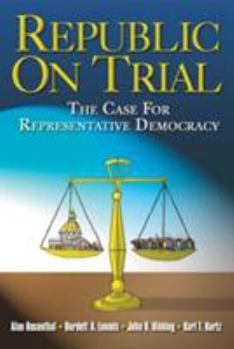Republic on Trial: The Case for Representative Democracy
Select Format
Select Condition 
Book Overview
Despite all the arguing from politicians, special interests, and political parties, Americans basically agree on the most important political issues. If only our legislators would stop fighting over obtuse policy details and really listen to what ordinary Americans want, representatives on Capitol Hill and in the statehouses would actually get something done, right? Wrong. Americans perceive consensus when in reality there is none. The fact...
Format:Paperback
Language:English
ISBN:1568026528
ISBN13:9781568026527
Release Date:July 2002
Publisher:CQ Press
Length:226 Pages
Weight:0.75 lbs.
Dimensions:0.5" x 6.0" x 9.0"
Customer Reviews
1 rating
Representative Democracy Withstands Trials
Published by Thriftbooks.com User , 22 years ago
This book presents a strong defense for representative democracy. It argues that not only is representative democracy the best option available, but that much of the criticisms of the the legislative branch is based on inaccurate perceptions. The public has become less trustful of government. Polls show about 75% of the public during the 1960s trusted government. In 1973, 42% of those polled had "a great deal" or "quite a bit" of confidence in Congress, In mid-2001, 26% stated that had a "great deal" or "quite a bit" of confidence in Congress. The public distaste for politics along with the mean spiritedness of campaigns discourages many capable people from even entering politics. Further, many who do select public service as a career are finding the burdens of service are causing them to leave public careers prematurely. The loss of dedicated public servants weakens the legislative process as well as reduces the public image of legislatures. While the public may be disillusioned with representative democracy, and while politicians may similarly have reservations, the alternatives are no better. The authors argue that the option of Executive dominance can lead to concentrated and abused power. The alternative of direct democracy may be cumbersomely unpractical and may be more readily manipulated by powerful interests. Negative campaign advertising is cited as a major influence in the declining appreciation and respect for politics and for government. Political scientist Richard Fenno has found that negative campaigning is further affecting government, as candidates are elected by claiming their opposition to the institutions to which they seek eleciton and, upon election, their negativity hampers their abilities to serve in office. The authors note the very nature of legislative politics is bound to create negative public perceptions. Most legislation that is passed reflects compromises and the mere act of compromising often leads proponents and opponents both feeling disappointed. Legislative work thus usually wins few friends, yet it produces important results. Despite its complexities and nuances, representative democracy does work. The legislative branch does a good job of bridging the gap between the public and policy makers. The alternative of administrative control concentrates power too much and the alternative of direct participation is too cumbersome. Representative democracy may not be perfect, as this book discusses, but it is the best system there is. Readers wishing to explore these discussions will greatly appreciate this book.





